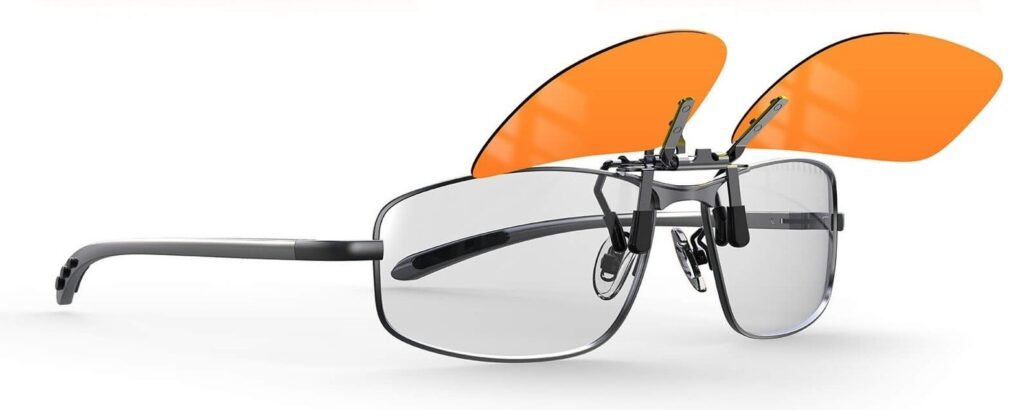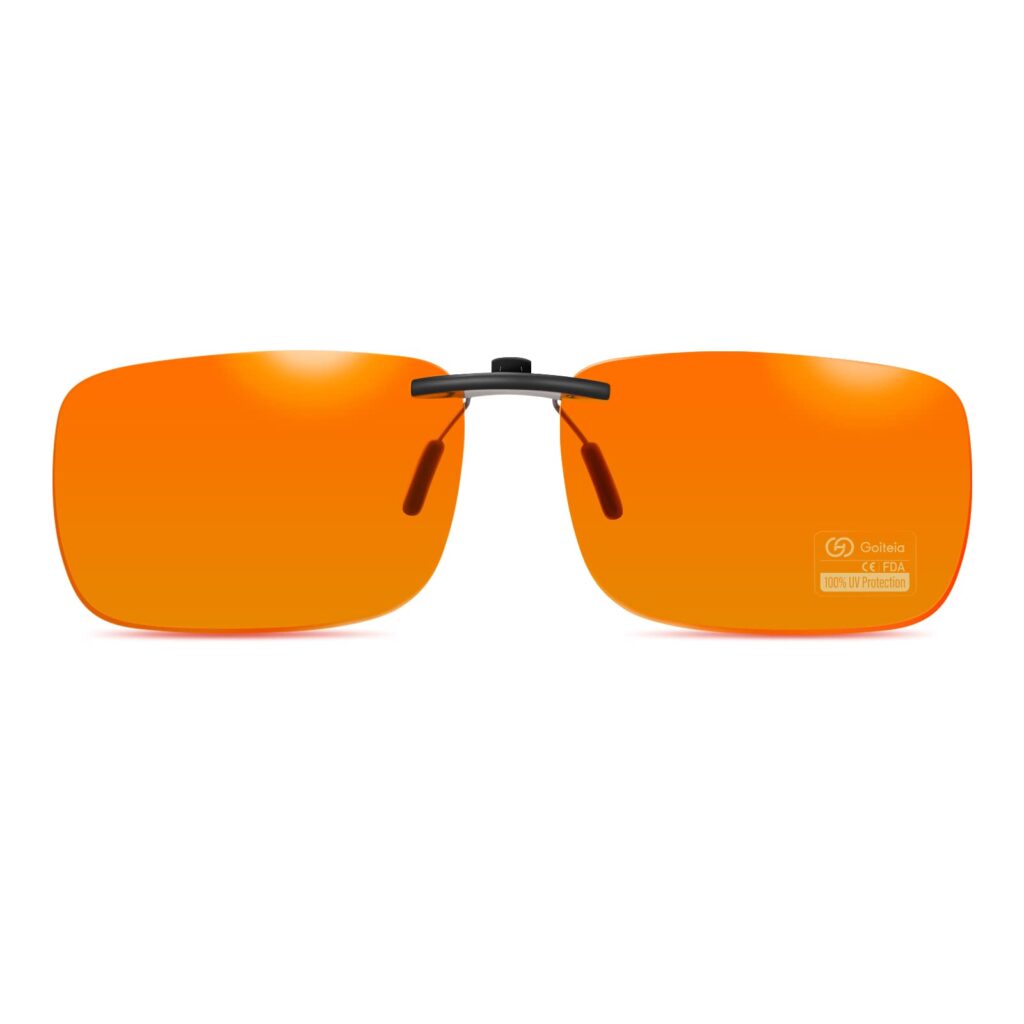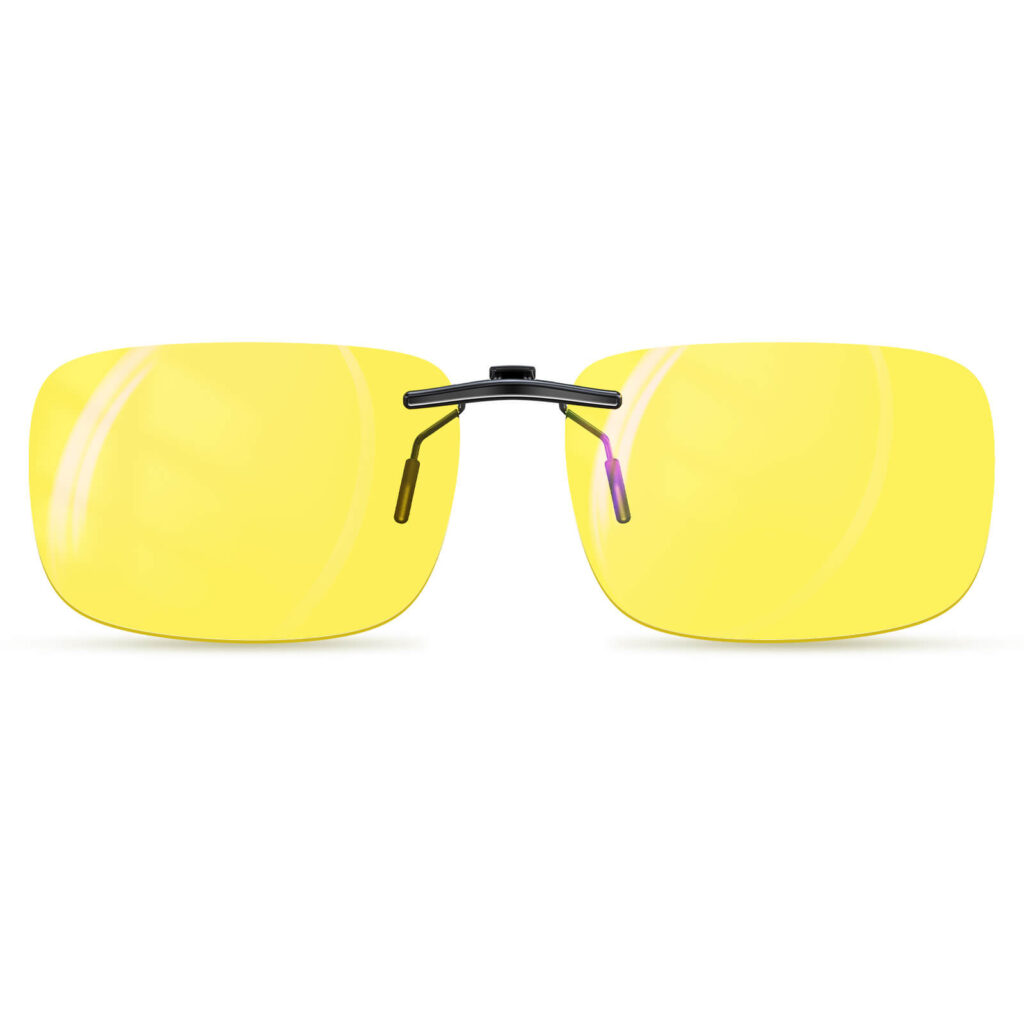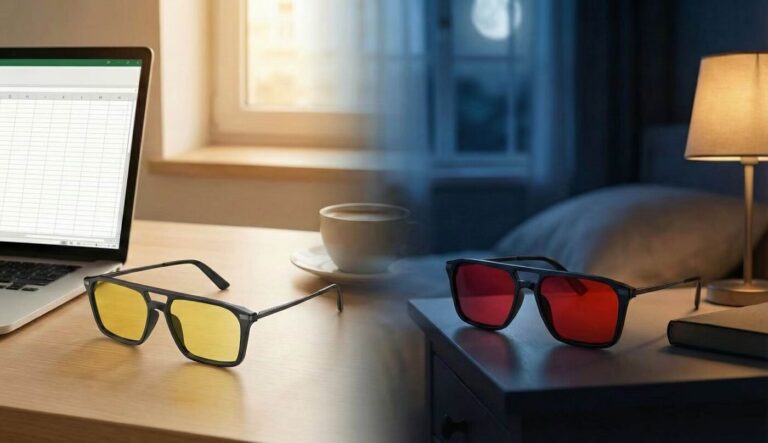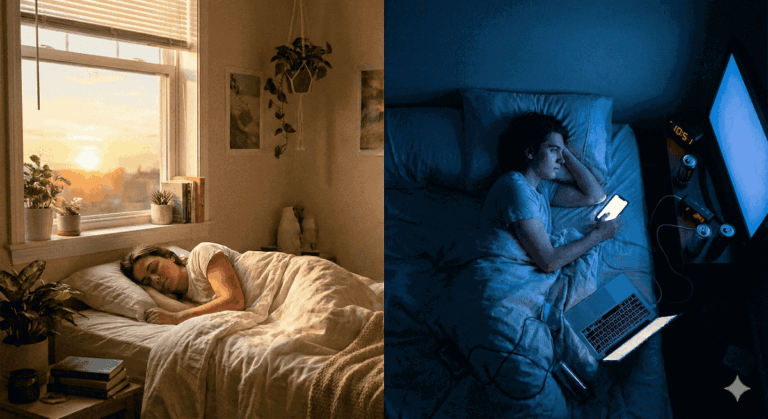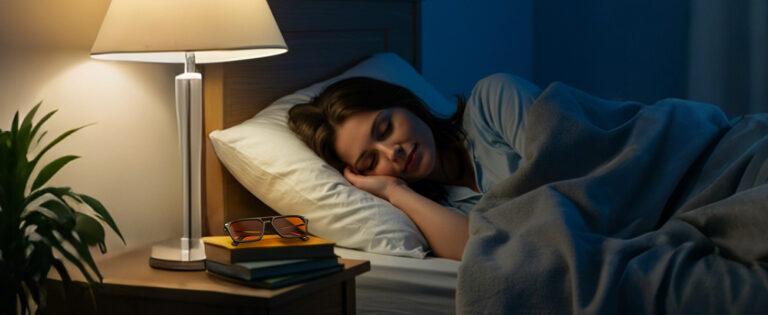Free UK/DE/FR/IT/ES/US Shipping, Other Countries (Free on Orders Over £50) SHOP NOW
In our digital age, Anti Blue Light Glasses have become more than just a trendy accessory—they’re a tool designed to help protect your eyes from the potential harm of blue light exposure. But with so many options out there, how do you find the best pair for your unique needs? Let’s break down everything you need to know to make an informed choice and get the most out of your blue light glasses.
Impact of Blue Light on Eye Health
Connection Between Blue Light Exposure and Eye Fatigue
Ever felt like your eyes are burning after a long day at the computer? That’s not just you—blue light can contribute to eye fatigue. Blue light, with its high energy and short wavelength, scatters more easily than other types of light. This scattering makes it harder for your eyes to focus, leading to increased strain and discomfort. When you’re staring at a screen for hours on end, your eyes work harder, and you might end up with tired, dry eyes. Blue light glasses can help by filtering out some of this intense light, making it easier for your eyes to relax.
The Link Between Blue Light Exposure and Poor Sleep Quality
Struggling to fall asleep after a late-night Netflix binge? Blue light might be to blame. Exposure to blue light in the evening can interfere with your body’s production of melatonin, the hormone that regulates sleep. When melatonin levels are disrupted, falling asleep can become more difficult and your sleep quality can suffer. Blue light glasses, especially if worn in the evening, can help minimize this disruption by reducing blue light exposure, which might help improve your sleep.
Brief Overview of the Purpose of Blue Light Glasses
Blue light glasses are designed to filter out blue light, which is emitted by screens, LED lighting, and various digital devices. The goal is to reduce the strain on your eyes and improve overall comfort during prolonged periods of screen use. By blocking a portion of blue light, these glasses aim to help alleviate symptoms of eye strain, fatigue, and potential disruption to your sleep cycle.
Who Should Consider Anti Blue Light Glasses?

Target Audiences for Anti Blue Light Glasses
Long Hours in Front of a Computer: For those who work at a computer for extended periods, blue light blocking glasses can help reduce eye strain and discomfort.
Frequent Smartphone Use: People who spend a lot of time on their phones or tablets can benefit from blue light glasses to alleviate digital eye strain.
Gaming Sessions: Gamers who play for hours can use blue light glasses to protect their eyes from the intense blue light emitted by screens.
Late-Night Screen Time: If you often use screens late into the evening, blue light glasses can help minimize disruption to your sleep cycle by reducing blue light exposure.
Reading E-books: Those who read e-books on tablets or e-readers can use blue light glasses to make reading more comfortable and reduce eye fatigue.
Working in Low-Light Environments: Blue light clips can be useful for individuals who work in dimly lit spaces where the contrast between the screen and surroundings can increase eye strain.

Specific Recommendations for Different Age Groups
Children: Kids’ eyes are more sensitive to blue light due to their developing lenses. If your child spends a lot of time on digital devices, consider getting blue light glasses designed for children to help protect their young eyes. Adults: For adults who work at computers or use screens extensively, blue light glasses can help manage symptoms of eye strain and improve comfort during long work sessions. Seniors: As we age, our eyes become more susceptible to damage from blue light. Seniors might find blue light glasses useful for reducing glare and eye strain, enhancing overall visual comfort.
Assessing Personal Needs and Lifestyle
When choosing blue light glasses, consider your personal screen habits and lifestyle. Are you looking for glasses to wear all day or just during specific times? Do you need them to fit over prescription lenses, or are you looking for something stylish for casual use? Identifying your specific needs will help you find a pair that fits seamlessly into your daily routine.
Practical Tips for Selecting the Right Anti-Blue Light Glasses
What to consider when purchasing Anti Blue Light Glasses
When purchasing blue light glasses, it’s essential to consider a few key factors to ensure you choose the right pair for your needs. Start by assessing your daily screen time, as this will determine the level of protection you require. Then, look for glasses that are certified to block blue light effectively, ensuring they meet industry standards. Finally, decide on the lens color based on your specific needs. These considerations will guide you in selecting the best blue light glasses for your lifestyle.
Look for Certification
When shopping for blue light glasses, one of the most important things to check is whether the glasses are certified to block blue light. Certifications are a way to ensure that the product has been tested and meets specific standards for blue light blocking. Look out for labels that specify the percentage of blue light blocked or any other scientific validations included with the product.
Assess Your Screen Time
Consider how much time you spend in front of screens each day. Do you work on a computer for most of the day? Are you glued to your smartphone during breaks? Maybe you watch TV or game in the evenings? If you’re a heavy user, your eyes are exposed to significant blue light. This can lead to eye strain, headaches, and even disrupt your sleep cycle. Spending six to eight hours a day on digital devices requires glasses with higher blue light blocking capabilities. Aim for ones that block at least 90% of harmful blue light. This level of protection helps keep your eyes comfortable and reduces fatigue.
Choose the Right Lens Color
The color of the lenses is more than just an aesthetic choice—it directly impacts how well your glasses will protect your eyes from blue light. There are typically two main types of lenses to choose from: clear and tinted.
Clear Lenses are the most common and are ideal if you want blue light protection without altering the colors on your screen. Clear lenses are versatile and less intrusive, making them a great option for everyday wear. They’re especially popular among people who need to see accurate colors for tasks like graphic design, photo editing, or even just watching videos.
Tinted Lenses: If you’re someone who spends extensive hours in front of screens and experiences significant eye strain or sleep disturbances, tinted lenses might be a better choice. These lenses, which often come in shades of yellow or amber, provide more robust blue light protection. The tint helps to filter out more of the harmful blue light, which can be especially beneficial during long work sessions or late-night screen time. However, the downside is that tinted lenses can slightly alter how colors appear, which might not be suitable for everyone. For instance, if you’re working with color-sensitive tasks, the tint might skew the hues on your screen.
Ultimately, choosing between clear and tinted lenses comes down to your specific needs and how much blue light exposure you’re dealing with daily. If you’re on the screen all day and into the night, tinted lenses might provide the extra protection you need. On the other hand, if you want to maintain color accuracy and still get some level of protection, clear lenses are a solid choice.
Clip-On Glasses: A Handy Type of Blue Light Blocking Glasses
If you already wear prescription glasses, buying a new pair of blue light glasses might not be ideal. This is where clip-on blue light glasses are useful. They offer a practical solution for those who want blue light protection without the hassle of switching between multiple pairs of glasses.
Easy Attachment and Removal
One of the biggest advantages of clip-on glasses is their convenience. They attach easily to your existing prescription glasses using a simple clip mechanism. Whenever you need blue light protection, just clip them on. When you don’t need them, you can easily take them off. This is especially useful if you want blue light protection only at certain times, like during long screen use or in the evening before bed.
Cost-Effective Solution
Clip-on glasses offer a cost-effective alternative to buying a new pair of glasses. They are designed to work with your existing glasses, effectively giving you two pairs in one. This makes them perfect for budget-conscious shoppers who want blue light protection. Additionally, they are often more affordable than regular blue light glasses. This affordability makes them a great option for anyone wanting to try blue light protection without a significant financial commitment.
Versatility for Different Lifestyles
Clip-on glasses are incredibly versatile. Whether at work, home, or on the go, they adapt quickly to your needs. Their lightweight and portable design means you can easily carry them in your bag or pocket. Attach them whenever you need extra eye protection. This makes clip-ons an ideal choice for people with busy, on-the-go lifestyles who need flexible solutions for their eye care.
No Need for Multiple Pairs of Glasses
If you have multiple pairs of prescription glasses for different purposes, such as reading glasses and distance glasses, clip-ons can be a lifesaver. Instead of purchasing separate blue light glasses for each pair, you can use the same clip-ons across all your glasses. This not only saves you money but also reduces the hassle of having to keep track of multiple pairs of glasses.
conclusion
Selecting the right anti-blue light glasses is crucial for reducing eye strain and improving comfort during extended screen use. Consider your daily screen time, the type of lenses that best fit your needs, and whether clip-ons offer a convenient solution. With the right pair, you can protect your eyes, alleviate discomfort, and enjoy clearer, more comfortable vision.
Frequently Asked Questions
How do I know if blue light glasses are working for me?
You can gauge the effectiveness of blue light glasses by monitoring your symptoms. If you notice a reduction in eye strain, headaches, and improved sleep quality, the glasses are likely working well for you.
How often should I replace my blue light glasses?
Replace your blue light glasses if they become damaged or scratched, as this can impact their effectiveness. If you notice a decrease in comfort or protection, it might also be time for a new pair.
Can blue light glasses prevent digital eye strain completely?
While blue light glasses can significantly reduce digital eye strain, they may not eliminate it entirely. It’s also important to take regular breaks from screens, practice good posture, and use proper lighting to further reduce eye strain.
Are there any side effects of wearing blue light glasses?
Blue light glasses are generally safe to wear. However, if you experience discomfort or visual distortion, it may be due to the lens tint or fit. Adjusting the glasses or consulting with an optometrist can help address these issues.
Can I wear blue light glasses while using prescription glasses?
Yes, you can wear blue light glasses over prescription glasses, or opt for clip-on blue light filters that attach to your existing eyewear. This provides the benefits of blue light protection without needing a separate pair of glasses.


